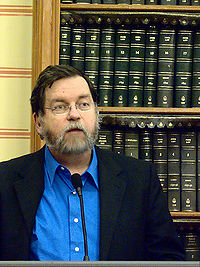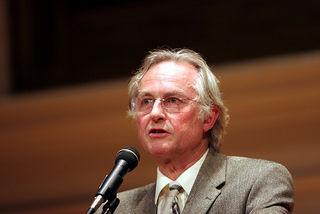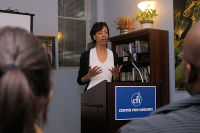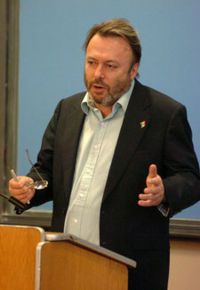Atheist Lawsuits And Public Relations
 From Conservapedia
From Conservapedia Atheist organizations in the Western World are often litigious. They use ligitation to restrict the degree of religious freedom in a society (see also: Atheist lawsuits and restrictions to religious freedom).
The Freedom From Atheism Foundation has a webpage on their website entitled "Ongoing Lawsuits".[1] The American Atheists has a webpage on their website entitled "Legal sucesses".[2] The Center for Inquiry engaged in lawsuits related to faith based initiatives concerning prison ministry.[3][4][5][6] See also: Atheist lawsuits
In June 2014, given the focus of atheist organizations on lawsuits, Sikivu Hutchinson wrote in the Washington Post that atheist organizations generally focus on church/state separation and creationism issues and not the concerns the less affluent African-American population faces.[7] Hutchinson also mentioned that church organizations do offer significant help to poor African-Americans.[7] See also: Atheism and charity and Western atheism and race
Atheist Sam Harris told a Newsweek reporter about atheism and public relations, "Frankly, it has a terrible PR campaign... It is right next to child molester as something you don't want to be."[8] See also: Atheism and public relations
Atheist organizations focusing on lawsuits - especially lawsuits involving manger seasons during the holiday season, reinforce the notion that atheists are bitter, angry and intolerant individuals (see: Atheism and anger and Atheism and bitterness and Atheism and intolerance).
In December 2003, the University of Warwick reported: "Dr. Stephen Joseph, from the University of Warwick, said: "Religious people seem to have a greater purpose in life, which is why they are happier. Looking at the research evidence, it seems that those who celebrate the Christian meaning of Christmas are on the whole likely to be happier."[9]}}
See also:
Contents
- 1 Madalyn Murray O’Hair on medical equiptment for a hospital vs. filing lawsuits
- 2 Atheist lawsuits against other atheists
- 3 Distrust of atheists
- 4 Attempts to rebrand atheism
- 5 See also
- 6 External links
- 7 Notes
Madalyn Murray O’Hair on medical equiptment for a hospital vs. filing lawsuits[edit]
Atheist lawsuits against other atheists[edit]
Distrust of atheists[edit]
See also: Distrust of atheists and Views on atheists
Concerning various views on atheists, sociological research indicates that atheists are widely distrusted in both religious cultures and nonreligious cultures.[10][11][12][13] According to a study published in the International Journal for The Psychology of Religion: "anti-atheist prejudice is not confined either to dominantly religious countries or to religious individuals, but rather appears to be a robust judgment about atheists."[12] The study found that many atheists do not trust other atheists as well.[12]
Science journal article in Nature on distrusts of atheism in countries[edit]

Fellow atheist biologist Massimo Pigliucci said of Myers, "one cannot conclude this parade without mentioning P.Z. Myers, who has risen to fame because of a blog where the level of nastiness (both by the host and by his readers) is rarely matched anywhere else on the Internet...".[14]
The Special Broadcasting Service reported:
| “ | According to a new study published last week in Nature, people all over the world connect immorality with atheism. In fact, the moral prejudice against atheists is so strong that it holds even in countries like the Netherlands, where most people aren’t religious. Even atheists themselves, according to the study, are inclined to see nonbelievers as more wicked than the faithful.,..
“Entrenched moral suspicion of atheists suggests that religion’s powerful influence on moral judgements persists, even among non-believers in secular societies,” the authors wrote. The study, led by University of Kentucky psychology professor Will Gervais, surveyed more than 3,000 people in 13 countries, including nations with Buddhist, Christian, Hindu, Muslim, and non-religious majorities: Australia, China, Czech Republic, Finland, Hong Kong, India, Mauritius, Netherlands, New Zealand, Singapore, United Arab Emirates, United Kingdom, and the United States. As they had hypothesised, the researchers found a universal suspicion of atheist morality across all 13 countries. “People overall are roughly twice as likely to view extreme immorality as representative of atheists, relative to believers,” they wrote. “Consistent with predictions, extreme intuitive moral distrust of atheists is both globally evident and variable in its magnitude across countries.” The association was somewhat stronger in more religious countries, but even in very secular countries in the study — Australia, China, the Czech Republic, the Netherlands, and the United Kingdom — people were more likely to associate serial killing with atheism, although the gap was narrower. The survey also asked participants to describe their religious beliefs, which allowed the research team to determine that even atheists connected immoral acts to atheism more often than to religious belief.[15] |
” |
Attempts to rebrand atheism[edit]
See also: Atheism and public relations and Attempts to positively rebrand atheism
Many atheist publicity campaigns, particularly one's by militant atheists, are generally designed to be provocative which has the effect of further lowering the public's view of atheism/atheists due to religious individuals being offended (see: Views on atheists).
A major obstacle to atheists public relations efforts is that the world as a whole is becoming more religious and secularization rates are zero in several developed countries.
In March 2015, the atheist philosopher John Gray in an article at The Guardian titled What scares the new atheists reported:
| “ | Today, it’s clear that no grand march is under way...The resurgence of religion is a worldwide development...For secular thinkers, the continuing vitality of religion calls into question the belief that history underpins their values."[16] | ” |
According to the American Marketing Association a brand "is a name, term, design, symbol, or any other feature that identifies one seller’s good or service as distinct from those of other sellers." Marketing experts also endeavor to change people's perceptions of ideologies, political parties, political candidates, etc. through branding efforts as well.

Atheists have made various attempts to rebrand atheism such as the Brights Movement, the New Atheism movement, the We Are Atheism campaign and the Out Campaign. Most of these efforts were ill-conceived or had scandals associated with them or backfired in other ways. For example, the New Atheism movement launched in 2004. The University of Minnesota reported in 2016 that over the previous ten years Americans negative view of atheists sharpened.[18]
The Innis Maggiore Ad Agency, which works with major corporations, says concerning rebranding/repositioning:
| “ | When a brand’s meaning is strongly established in the mind, it’s extremely difficult — if not impossible — to change. It is possible to refine, adjust and hone a brand’s meaning when necessary. But repositioning a brand with a wholesale change? Hardly a chance."[19] | ” |
Professor Eric Kaufmann predicted that somewhere between 2021-2050 the secular population will plateau in Europe and in the developed world and then decline.[20] Given the difficulty of changing the "atheism brand", if Kaufmann is correct, this means that atheists will in all likelihood run out time in terms of changing the atheism brand.
In the United States, the American Atheists organization has executed poor conceived public relation attempts. For example, the American Atheists sponsored an aggressive and controversial billboard and an interview with Fox News occurred as a result of the billboard (see: VIDEO). The ex-president of American Atheists David Silverman has a degree in marketing. But despite his degree in marketing, according to fellow atheist and evolutionist PZ Myers, Silverman was stuck defending a "badly designed, ugly" sign.[21]
New Atheism movement[edit]
See also: New Atheism
The term New Atheism, which first appeared in the November 2006 edition of Wired magazine, is frequently applied to a movement spawned by a series of six best-selling books by five authors that appeared in the period between 2004–2008. These authors include Richard Dawkins, Christopher Hitchens, Sam Harris, Daniel Dennett and Victor J. Stenger.[22]
Richard Dawkins said about New Atheism, "[O]ur struggle is not so much an intellectual struggle, as a political one: What are we going to do about it?”.[23] Rhetorically, new atheists often took an aggressive, intolerant tone (see: Atheism and intolerance).
Steven Poole wrote in The Guardian about New Atheism: "New Atheism’s arguments were never very sophisticated or historically informed."[24]
New Atheism and celebrity atheists[edit]
See also: Atheism and mass murder and Irreligion/religion and war and Atheism and violence and Celebrity atheists
It is estimated that in the past 100 years, governments under the banner of atheistic communism have caused the death of somewhere between 40,472,000 and 259,432,000 human lives.[25] Dr. R. J. Rummel, professor emeritus of political science at the University of Hawaii, is the scholar who first coined the term democide (death by government). Dr. R. J. Rummel's mid estimate regarding the loss of life due to communism is that communism caused the death of approximately 110,286,000 people between 1917 and 1987.[26]
Theodore Beale notes concerning atheism and mass murder:
| “ | Apparently it was just an amazing coincidence that every Communist of historical note publicly declared his atheism … .there have been twenty-eight countries in world history that can be confirmed to have been ruled by regimes with avowed atheists at the helm … These twenty-eight historical regimes have been ruled by eighty-nine atheists, of whom more than half have engaged in democidal acts of the sort committed by Stalin and Mao …
The total body count for the ninety years between 1917 and 2007 is approximately 148 million dead at the bloody hands of fifty-two atheists, three times more than all the human beings killed by war, civil war, and individual crime in the entire twentieth century combined. The historical record of collective atheism is thus 182,716 times worse on an annual basis than Christianity’s worst and most infamous misdeed, the Spanish Inquisition. It is not only Stalin and Mao who were so murderously inclined, they were merely the worst of the whole Hell-bound lot. For every Pol Pot whose infamous name is still spoken with horror today, there was a Mengistu, a Bierut, and a Choibalsan, godless men whose names are now forgotten everywhere but in the lands they once ruled with a red hand. Is a 58 percent chance that an atheist leader will murder a noticeable percentage of the population over which he rules sufficient evidence that atheism does, in fact, provide a systematic influence to do bad things? If that is not deemed to be conclusive, how about the fact that the average atheist crime against humanity is 18.3 million percent worse than the very worst depredation committed by Christians, even though atheists have had less than one-twentieth the number of opportunities with which to commit them. If one considers the statistically significant size of the historical atheist set and contrasts it with the fact that not one in a thousand religious leaders have committed similarly large-scale atrocities, it is impossible to conclude otherwise, even if we do not yet understand exactly why this should be the case. Once might be an accident, even twice could be coincidence, but fifty-two incidents in ninety years reeks of causation![27][28] |
” |
The article Why the arguments of the ‘New Atheists’ are often just as violent as religion states:
| “ | Celebrity atheists such as Richard Dawkins appear to claim the moral high ground when it comes to violence. Dawkins, along with Sam Harris and the late Christopher Hitchens, insist that because religion is intrinsically violent, then atheism is inherently more pacific. After all, if all the evils in the world can be blamed on religion, then arguably eliminating religion is not only desirable but a moral obligation for atheists who believe in peace.
Yet our research shows that in the War on Terror, these atheists have been surprisingly willing to align themselves with policies which are at least as violent – and in some cases more so – than many of those perpetrated in the name of religion... Their arguments are not new. But, unlike more ponderous academic atheist philosophers, they seemingly cultivated combative and acerbic, media-savvy personae. Their success at writing bestselling books, giving engaging public talks and cultivating a global following through social media, has made them minor celebrities. For example, Dawkins has been depicted in South Park, Family Guy and The Simpsons – and even made a cameo appearance in Dr. Who.[29] |
” |
Decline of the New Atheism movement[edit]
See also: Decline of militant atheism in the West and Decline of New Atheism and the media
On November 6, 2015, the New Republic published an article entitled, Is the New Atheism dead?[30] In 2013, Theo Hobson wrote an article published at The Spectator entitled Richard Dawkins has lost: meet the new new atheists[31] The atheist and evolutionary biologist David Sloan Wilson wrote, "The world appears to be tiring of the New Atheism movement.."[32]
In 2015, the atheist author Joshua Kelly wrote:
| “ | ...since the death of Hitchens: angry atheism lost its most charismatic champion. Call it what you like: New Atheism, fire-brand atheism, etc., had a surge with the Four Horsemen in the middle of the last decade and in the last four years has generally peetered out to a kind that is more docile, politically correct, and even apologetic.[33] | ” |
YouTube's atheist Thunderfoot said about the atheist movement after Reason Rally 2016 had a very low turnout:
| “ | I'm not sure there is anything in this movement worth saving. Hitchens is dead. Dawkins simply doesn't have the energy for this sort of thing anymore. Harris went his own way. And Dennett just kind of blended into the background. So what do you think when the largest gathering of the nonreligious in history pulls in... I don't know. Maybe 2,000 people. Is there anything worth saving?[34] | ” |
Professor James W. Jones wrote at a Oxford University Press website:
| “ | We seem to be witnessing a broad reaction against the New Atheism movement by atheists as well as religious believers, whether undermining the idea of a long-standing conflict between science and religion, or taking a critical view of their political agenda. James Ryerson recently examined three new books (including my own) in the New York Times Book Review – a small sample of a growing body of work...
The New Atheism movement is receiving a powerful attack from another side as well — the politics implicit in their worldview. Two books published this year exemplify this critique, in which militant atheism is seen as an anti-progressive “secular fundamentalism.” C.J. Werleman, in The New Atheist Threat: The Dangerous Rise of Secular Extremists, himself formerly a militant atheist, describes the New Atheists’ uncritical devotion to science, their childish understanding of religion, their extreme Islamophobia, and intolerance of cultural diversity.[35] |
” |
Besides the death of Hitchens, another major of factors which caused the decline of New Atheism were: Richard Dawkins' loss of influence due to his Elevatorgate scandal and his critical comments toward Islam (see: Richard Dawkins and Islamophobia accusations).
Theo Hobson on young atheists and the New Atheism approach[edit]
Theo Hobson wrote in The Spectator in 2013:
| “ | The atheist spring that began just over a decade ago is over, thank God. Richard Dawkins is now seen by many, even many non-believers, as a joke figure...
Atheism is still with us. But the movement that threatened to form has petered out. Crucially, atheism’s younger advocates are reluctant to compete for the role of Dawkins’s disciple. They are more likely to bemoan the new atheist approach and call for large injections of nuance. A good example is the pop-philosopher Julian Baggini. He is a stalwart atheist who likes a bit of a scrap with believers, but he’s also able to admit that religion has its virtues, that humanism needs to learn from it. For example, he has observed that a sense of gratitude is problematically lacking in secular culture, and suggested that humanists should consider ritual practices such as fasting.[36] |
” |
We Are Atheism campaign[edit]
See also: We Are Atheism
The We Are Atheism campaign is an initiative launched in 2011 to promote atheism by means of having atheist be more outspoken about their atheism instead of hiding it from others.[37]
As far as various views on atheists within the United States, research in the American Sociological Review finds that among several groups listed, atheists are the group that Americans relate least to in terms of their vision of American society and are the group most likely to be mentioned as one that Americans would not want to have marry into their family. [38] Dr. Sam Harris is one of the founders of the New Atheism movement. Sam Harris is quite aware of the stigma surrounding atheism and has even advocated that atheists no longer call themselves atheists.[39] In fact, Dr. Harris has said concerning the label of atheist, "It's right next to child molester as a designation."[40]
We Are Atheism scandal[edit]
See also: Atheist organizations and scandals and Atheism and stealing
Hemant Mehta wrote in 2015:
| “ | Earlier this year, I posted a series of concerns I had about a group called We Are Atheism.
The group raised money from atheists after tragic events and natural disasters, supposedly to help victims and their families, but the money didn’t always make it there. In some cases, it was given to people completely unaffected by the tragedies, unbeknownst to the donors at the time. The co-founders said publicly they weren’t taking a salary, even though they were. They said donations to the group were tax-deductible, even when they weren’t.... Several former board members of We Are Atheism later spoke up about why they resigned; their reasons included a lack of financial transparency in the organization. Since all of that went down, Lee Moore took over as President of We Are Atheism and Amanda Brown stepped down from the board (she no longer has a formal connection with the group). Moore vowed to get an independent tax firm to look over the group’s finances and pledged to make things right... So what happened with that independent tax firm?... Simply put: They couldn’t complete the audit. They asked Brown for access to certain accounts involving We Are Atheism’s money and they didn’t receive it.[41] |
” |
Brights Movement[edit]
See also: Brights Movement

The Brights Movement was started in 2003 by Paul Geisert and Mynga Futrell in 2003 in order to assist in the advocacy of a naturalistic worldview.[42][43] The Brights Movement is an internet constituency rather than a movement. The Brights movement had a media campaign and was announced in Wired magazine (by evolutionary biologist Richard Dawkins), Free Inquiry (by Richard Dawkins), and on the New York Times op-ed page (by the philosopher and atheist Daniel Dennett).
Although the Brights Movement was not successful due to many people indicating the name of the campaign gave the impression of intellectual smugness, the publicly given rationale for the movement was that atheism needs a more bright/warm/cheerful/positive/inquisitive image.[44][45][46] See also: Atheism and inspiration.
The ABC News.com commentator John Allen Paulos remarked of the “brights” campaign, “I don’t think a degree in public relations is needed to expect that many people will construe the term as smug, ridiculous, and arrogant.”[47] The Brights Movement largely came about because the label "atheist" has such a bad reputation. The atheist Sam Harris has said concerning the label of atheist, "It's right next to child molester as a designation." (See also: Views on atheists and Atheism and social outcasts).[48]
According to a 2003 Skeptical Enquirer article by Christ Mooney, "From the start, the “brights” label label reinforced a longstanding stereotype. Atheists already have a terrible rap for being coldhearted rationalists who attend Mensa gatherings and dismiss religious believers as simple-minded fools."[49] In October of 2003 in a article in the Guardian Dawkins associated being a "bright" with being an intellectual.[50]
See also: Atheism and arrogance and Atheism and social intelligence and Atheism and intelligence
Atheism and historical revisionism[edit]
See also: Atheism and historical revisionism
Celebrity atheists[edit]
See: Celebrity atheists
See also[edit]
External links[edit]
- Atheists attempt pubic relations by Dr. Albert Mohler, Jr.
- Atheism's public relations problems by Ken Ammi at True Freethinker
Notes[edit]
- ↑ Ongoing Lawsuits - Legal - Freedom From Religion Foundation
- ↑ Legal sucesses - American Atheists
- ↑ Postal, Leslie (April 20, 2011). Bill asks voters to OK taxpayer funding of religious institutions. Orlando Sentinel.
- ↑ Mazzei, Patricia (April 27, 2011). Blaine amendment repeal passes Florida house. Tampa Bay Times.
- ↑ Center for Inquiry will not appeal adverse decision in Florida lawsuit. CFI (February 8, 2016).
- ↑ Bettis, Kara (February 23, 2016). Atheists drop suit to block Christian prison ministry funding. New Boston Post. Retrieved on May 16, 2016.
- ↑ 7.0 7.1 Atheism has a big race problem that no one’s talking about by Dr. Sikivu Hutchinson, Washington Post June 16, 2014
- ↑ NEWSWEEK Poll: 90% Believe in God, Newsweek 2007
- ↑ http://www.scienceblog.com/community/older/2003/A/20037338.html
- ↑ Study: Atheists distrusted as much as rapists
- ↑ Atheists Widely Distrusted, Even Among Themselves, UK Study Finds, Christian Post, 2015
- ↑ 12.0 12.1 12.2 Anti-atheist distrust ‘deeply and culturally ingrained’, study finds, The Independent, 2015
- ↑ Edgell, Gerteis & Hartmann 2006
- ↑ Reflections on the skeptic and atheist movements By Massimo Pigliucci Scientia Salon, Posted: May 13, 2015
- ↑ Everyone’s suspicious of atheists — even other atheists, The Special Broadcasting Service, 2017
- ↑ What scares the new atheists by John Gray, The Guardian, March 3, 2016
- ↑
- Shall the Religious Inherit the Earth?: Demography and Politics in the Twenty-First Century by Eric Kaufmann, Belfer Center, Harvard University/Birkbeck College, University of London
- Eric Kaufmann: Shall The Religious Inherit The Earth?
- Eric Kaufmann's Atheist Demographic series
- Eric Kaufmann: Shall the Religious Inherit the Earth?, Australian Broadcasting Corporation
- ↑ Atheists Remain Most Disliked Religious Minority in the US
- ↑ Repositioning a Brand: JCPenney showed brand reinvention can stretch only so far by Dick Maggiore at the Innis Maggiore Ad Agency
- ↑
- Shall the Religious Inherit the Earth?: Demography and Politics in the Twenty-First Century by Eric Kaufmann, Belfer Center, Harvard University/Birkbeck College, University of London
- Eric Kaufmann: Shall The Religious Inherit The Earth?
- Eric Kaufmann's Atheist Demographic series
- Eric Kaufmann: Shall the Religious Inherit the Earth?, Australian Broadcasting Corporation
- ↑ http://scienceblogs.com/pharyngula/2011/01/that_controversial_oreilly_int.php
- ↑ http://www.colorado.edu/philosophy/vstenger/battle.html
- ↑ Faithless: The politics of new atheism by Steven Kettell
- ↑ The Four Horsemen review - whatever happened to ‘New Atheism’? by Steven Poole, Thu 31 Jan 2019 02.30
- ↑ Multiple references:
- The Black Book of Communism The Human cost of Communism - 100 Million, IndyMedia, April 4. 2004, Retrieved 5/23/2015
- "The Black Book of Communism". Harvard University, Faculty of Arts and Sciences website: Cold War Studies. Retrieved July 19, 2014.
- Rummel, R. J. (November 1993). "How many did communist regimes murder?" University of Hawaii website; Freedom, Democracy, Peace; Power, Democide, and War. Retrieved July 19, 2014.
- White, Matthew (February 2011). "Source list and detailed death tolls for the primary megadeaths of the twentieth century". Necrometrics. Retrieved July 19, 2014.
- Higgins, David (June 22, 2007). "Memory and ideology: Washington's newest statue is the Victims Of Communism Memorial". Sarasota Magazine website. Retrieved from October 8, 2007 archive at Internet Archive on May 22, 2015.
- Radosh, Ronald (February 2000). "The Black Book of Communism: Crimes, Terror, Repression". First Things [journal] website. Retrieved July 19, 2014.
- ↑ Rummel, R. J. (November 1993). "How many did communist regimes murder?" University of Hawaii website; Freedom, Democracy, Peace; Power, Democide, and War. Retrieved July 19, 2014.
- ↑ Vox Day, The Irrational Atheist: Dissecting the Unholy Trinity of Dawkins, Harris, and Hitchens (Dallas, TX: BenBella Books, Inc.), 2008, p. 17.
- ↑ Ammi, Ken (June 11, 2009). "Atheism [quoting Vox Day]". Creation Ministries International. Retrieved on July 19, 2014.
- ↑ Why the arguments of the ‘New Atheists’ are often just as violent as religion
- ↑ Is the New Atheism dead? by Elizabeth Bruenig, New Republic, November 6, 2015
- ↑ Richard Dawkins has lost: meet the new new atheists by Theo Hobson
- ↑ The New Atheism as a Stealth Religion: Five Years Later by David Sloan Wilson, Evolution Institute website
- ↑ Uproar Against Dawkins Is Sign of New Atheism Retrogression by Joshua Kelly
- ↑ Even atheists bash 'Reason Rally'
- ↑ Growing criticism by atheists of the New Atheism movement by James W. Jones, Oxford University Press, OUPblog
- ↑ Richard Dawkins has lost: meet the new new atheists by Theo Hobson
- ↑ About We are Atheism
- ↑ Edgell, Gerteis & Hartmann 2006
- ↑ http://newsinitiative.org/story/2007/06/19/interview_with_an_atheist
- ↑ http://newsinitiative.org/story/2007/06/19/interview_with_an_atheist
- ↑ An Update on We Are Atheism by Hemant Mehta, September 15, 2015
- ↑ http://findarticles.com/p/articles/mi_m2843/is_2_28/ai_114090211/pg_1
- ↑ http://www.the-brights.net/vision/faq.html#1
- ↑ The future looks bright, by Richard Dawkins, The Guardian
- ↑ [ https://www.nytimes.com/2003/07/12/opinion/the-bright-stuff.html The Bright Stuff], Daniel Dennett, The New York Times
- ↑ Not Too “Bright", Skeptical Enquirer, Chris Mooney, October 15, 2003
- ↑ Not Too “Bright", Skeptical Enquirer, Chris Mooney, October 15, 2003
- ↑ http://newsinitiative.org/story/2007/06/19/interview_with_an_atheist
- ↑ Not Too “Bright", Skeptical Enquirer, Chris Mooney, October 15, 2003
- ↑ http://books.guardian.co.uk/review/story/0,12084,981412,00.html
Categories: [Atheism]
↧ Download as ZWI file | Last modified: 03/13/2023 15:54:12 | 101 views
☰ Source: https://www.conservapedia.com/Atheist_lawsuits_and_public_relations | License: CC BY-SA 3.0
 ZWI signed:
ZWI signed:



 KSF
KSF